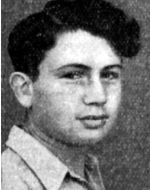Grohman, Shmuel
Son of Friedl and David, born in 1925 in Lodz, Poland, and educated in a conservative Hassidic family, at the age of 17, his parents died and he was forced to provide for his own livelihood. After the liberation of the ghetto, he was sent to Germany and interned in an extermination camp, but managed to survive, and after his liberation he moved to the city of Tarf in France, joined the United Pioneering Youth Movement, , And was deported to Cyprus. He spent 7.5 months in Cyprus and immigrated to Israel in 1947. Shmuel came to Kibbutz Afikim and devoted himself enthusiastically to work in the vegetable garden. The sense of Hasidism and its dances left a deep impression on his soul from his childhood, and as he was in the movement, the Chasidic enthusiasm he inspired from his friends aroused in him from time to time. He was a little talkative and he did most of the work, burdened himself with every heavy burden and served as an example to his many friends, who liked him very much and he returned them affection. He demanded much from himself and others, and did not know concessions. Every human weakness made him sick. Most of his poems were sung in secret and nobody knew. But the fermented wine fermented him with bonfires, and always restrained his sadness, and he wrote in his poem “The Dance” (translated from Yiddish): ” After 29.11.1947, the day of the United Nations General Assembly resolution on partition, he demanded that he be recruited into the “Barak” battalion of the Golani Brigade and participated in many of the operations of that battalion.65 On May 6, 1948, a force that raided the village of Arab al- On the 27th of Nissan 5708 (May 6, 1948), he was brought to rest in the Beit Keshet cemetery.
